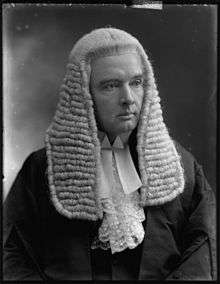Thomas Artemus Jones
His Honour Sir Thomas Artemus Jones KC LLD (1871 – 15 October 1943), was a Welsh Judge, journalist, nationalist and Liberal Party politician who campaigned for the Welsh language.

Background
Jones was born in Denbigh, the youngest son of stonemason Thomas Jones. In 1927 he married Mildred Mary David. He was knighted in 1931.[1]
Political career
Jones was a Liberal and first active in the Cymru Fydd movement, along with David Lloyd George. He was selected as Liberal candidate for Merthyr against James Keir Hardie in 1913, for a General Election expected to take place in 1914/15.[2] After the Liberal Party split between supporters of the Coalition government led by Lloyd George and those of the opposition Liberals led by H.H. Asquith, Jones sided against Lloyd George. After 1918 he sought the Liberal nomination in the Gower constituency but his hostility to the Coalition Government did not go down well and he did not win the nomination.[3] In 1922, with Liberals opposed to Lloyd George struggling to find Welsh constituencies willing to adopt them, he was forced to look elsewhere and was adopted in the unpromising seat of Macclesfield, where no Liberal had stood at the previous election. Despite this, at the general election he came second, comfortably pushing the Labour candidate into third place. Following Liberal reunion in 1923, he was able to get adopted to contest a Welsh constituency. He was chosen for the marginal Labour seat of Swansea East, which the Liberals had lost in 1922. However, he failed to take the seat from Labour at the 1923 General Election. In 1924 he was chosen to be the Liberal candidate with the task of retaining the marginal seat of Keighley. However, a Unionist candidate intervened in the contest and Jones was edged into third place. He did not stand for parliament again.[4] He campaigned for a repeal of section 17 of the 1536 Act of Union which gave no legal status to the Welsh language. He highlighted a particular legal case in 1933 when the chairman, jurors, advocates, the justices, the prisoner and all the witnesses spoke Welsh, yet the trial had to be conducted in English because the court shorthand writer was an Englishman who spoke no Welsh.[5] Following a UK wide petition, the section was repealed by the Welsh Courts Act of 1942. He was a key supporter of the Liberal William John Gruffydd in the 1943 University of Wales by-election.[6] He was one of the first people to call for an appointment of a Secretary of State for Wales.
In 1944 his autobiography Without my Wig was published.[7]
Electoral record
| Party | Candidate | Votes | % | ± | |
|---|---|---|---|---|---|
| Unionist | John Rumney Remer | 15,825 | 48.1 | -10.1 | |
| Liberal | Thomas Artemus Jones | 10,477 | 31.9 | n/a | |
| Labour | Andrew Joseph Penston | 6,584 | 20.0 | ||
| Majority | 5,348 | 16.2 | |||
| Turnout | 86.0 | + | |||
| Unionist hold | Swing | ||||
| Party | Candidate | Votes | % | ± | |
|---|---|---|---|---|---|
| Labour | David Williams | 12,735 | 57.4 | +6.5 | |
| Liberal | Thomas Artemus Jones | 9,463 | 42.6 | -6.5 | |
| Majority | 3,272 | 14.8 | +13.0 | ||
| Turnout | 81.1 | -0.6 | |||
| Labour hold | Swing | +6.5 | |||
| Party | Candidate | Votes | % | ± | |
|---|---|---|---|---|---|
| Labour | Hastings Bertrand Lees-Smith | 14,105 | 45.0 | ||
| Unionist | T P Perks | 8,922 | 28.4 | n/a | |
| Liberal | Thomas Artemus Jones | 8,339 | 26.6 | ||
| Majority | 5,183 | 16.5 | |||
| Turnout | 31,366 | ||||
| Labour gain from Liberal | Swing | ||||
External links
- Cymru Culture: http://www.cymruculture.co.uk/featuredarticles_94921.html
References
- ‘JONES, His Honour Sir Thomas Artemus’, Who Was Who, A & C Black, an imprint of Bloomsbury Publishing plc, 1920–2015; online edn, Oxford University Press, 2014 ; online edn, April 2014 accessed 4 Oct 2015
- Rebirth of a Nation: Wales, 1880-1980 by Kenneth O. Morgan
- The Lloyd George Liberal Magazine, Volume 2
- British parliamentary election results 1918-1949, Craig, F.W.S.
- Without my Wig by Artemus Jones
- David Hughes Parry: A Jurist in Society by R. Gwynedd Parry
- ‘JONES, His Honour Sir Thomas Artemus’, Who Was Who, A & C Black, an imprint of Bloomsbury Publishing plc, 1920–2015; online edn, Oxford University Press, 2014 ; online edn, April 2014 accessed 4 Oct 2015
- Craig, F. W. S. (1983). British parliamentary election results 1918-1949 (3 ed.). Chichester: Parliamentary Research Services. ISBN 0-900178-06-X.
- Craig, F. W. S. (1983). British parliamentary election results 1918-1949 (3 ed.). Chichester: Parliamentary Research Services. ISBN 0-900178-06-X.